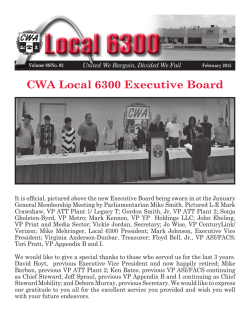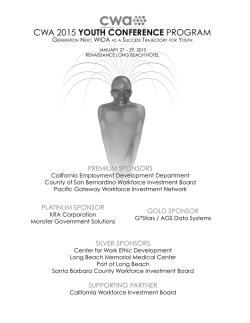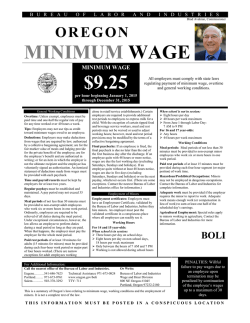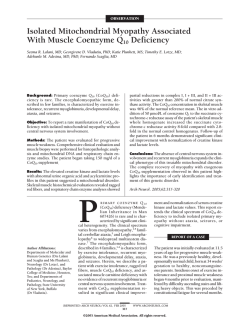
Wire Tap - cwa local 4603
Black History Month Local 4603 February 2015 One Hell of a Fight! The two boxers had fought an evenly matched fight for 8 or 9 rounds. Each had knocked the other to the canvass numerous times during the bout. They had punished each other so much it was impossible to tell who was winning. As the ninth round concluded, one of the fighters had been particularly rocked by his opponent and staggered to his corner. While seated in his corner trying to recover, the ring doctor leans over the rope to check on his condition to see if the match should continue. The doctor asks “Where are you?” Still stunned from the beating, the boxer quickly replies, “I’m in one hell of a fight.” The ring doctor allows the fight to go on, and the boxer that was so clearly rattled at the end of the ninth round goes on to knock out his opponent a few rounds later. The point here is that you and your union representatives are in one hell of a fight. Some of you may not even realize or acknowledge that fact, but you really are. Bargaining and politics are a conflict between two opponents, just like the boxers. If you’ve been rocked so badly that you don’t know where you are, the outcome of the contest will most likely not be in your favor. We as workers were already rocked hard this past November with the business friendly Republicans taking over control in Washington, and an even greater majority in Madison. Next will be your fight with AT&T to achieve a contract that will accomplish improvements in your wages and benefits. If you do not view these realities as they are and become actively involved in these processes, the outcome may not be to your benefit. You can sit home and blame the union if that’s the truth as you see it, but the real truth is “U are the Union”. If you choose to do nothing, you have chosen to not answer the bell for the next round. The battles of politics and bargaining are never ending, they just keep playing on and on. Spring Primary: Tuesday, February 17, 2015 Spring Election: Tuesday, April 7, 2015 There are no state offices currently on the Primary Ballot. I saw an interview on PBS hosted by Charley Rose. He was interviewing Ava DuVernay, the young African American director of the movie, Selma. The movie is about Martin Luther King and the conflict to get legislation to create and protect a voters rights act back in the 1960’s. During the interview, Ava brought up some details that are quite poignant of our history. Following Reconstruction of our nation after the Civil War (1865), African Americans were still not treated as full U.S. citizens. With the judicial ruling from Plessy v. Ferguson 1896 that established separate but equal, African Americans were told where they could get a drink of water, or where to ride on the public bus, or where they could get a cup of coffee. Discrimination on this level was prevalent up into the 1960’s. That ruling had deferred civil rights for over 60 years. when finally, legislation made “separate but equal” illegal, and a violation could be enforced. Many recent events across our nation have reinforced the notion that this conflict has not been completely resolved with the so called voter ID laws, and the shootings and protests. Each and everyone of us has a role in these situations. We are the judges in the court of public opinion in these matters. As the judge, it is your obligation to follow the intent of the U.S. Constitution to determine your ruling. If you rush to form your judgment or opinion, have you really given proper consideration to all of the evidence? Are you imposing your personal values over the rules spelled out in our constitution? Shouldn’t we include in our thoughts and actions everyday, our role in “forming a more perfect Union, establish Justice, insure domestic Tranquility, provide for the common Defence, promote the general Welfare, and secure the Blessings of Liberty?” We craft the society where we all must live together. The Civil Rights Act of 1964 The Civil Rights Act of 1964, was enacted July 2, 1964 and became the landmark piece of civil rights legislation in the United States. It made illegal, discrimination based on race, color, religion, sex, or national origin. It also ended unequal application of voter registration requirements and racial segregation in schools, at the workplace and by facilities that served the general public, aka "public accommodations". The powers given to enforce the act were initially weak, but were strengthened during later years. Congress asserted its authority to legislate under several different parts of the United States Constitution, principally its power to regulate interstate commerce under Article One (section 8), its duty to guarantee all citizens equal protection of the laws under the Fourteenth Amendment and its duty to protect voting rights under the Fifteenth Amendment. The Act was signed into law by President Lyndon B. Johnson on July 2, 1964, at the White House. The bill was called for by President John F. Kennedy in his civil rights speech in June 1963, in which he asked for legislation "giving all Americans the right to be served in (Continued on page 2) Polls are open from 7 a.m. to 8 p.m. Wisconsin voter turnout has traditionally been under 10 percent for Spring Primary elections. Wisconsin has an estimated voting-age population of 4,378,741 eligible voters, the number used to calculate turnout. Exercise Your Right to VOTE! Your Opportunity to be HEARD! Bargaining Ahead! Hey, only two months to go! April 11, 2015 The expiration of the current CWA/AT&T contract continues to move closer! CWA ROBERT LILJA MEMBERS’ RELIEF FUND The following information was taken from the CWAUnion.org web page. It is an explanation of two funds that exist to financially assist locals and members in the event that there is a work stoppage/strike. The History The CWA Defense Fund was established by the 1952 CWA Convention. Its funding is maintained by a fifty-cent per capita per month allocation from member and agency fee payer dues. CWA Defense Fund money is used to maintain the picket lines and reimburse Local Unions for increased costs, and other approved mobilization costs (as outlined in the Fund rules) during a strike. The CWA Robert Lilja Members’ Relief Fund was established by the 1990 CWA Convention. Its funding is maintained by an allocation of 1/4 hour of basic wages (.15%) per month from members and agency fee payers who are eligible to strike. CWA Robert Lilja Members’ Relief Fund money is used for direct assistance to strikers and victims of collective bargaining strategies, monies can also be used to provide necessary health care to strikers and victims (and dependents) of collective bargaining strategies. The CWA Robert Lilja Members’ Relief Fund (RLMRF) provides direct assistance to members and agency fee payers, Local Union Officers who are on the Local’s payroll and lose wages, and victims of collective bargaining strategies during sanctioned strikes. ASSISTANCE FROM THE FUND Payout Plan: 1. Commencing on the fifteenth (15th) day of a strike, $200.00 per striker per week will be provided (subject to availability of funds) for use by the Local for strikers' assistance. Commencing on the twenty-ninth day of a strike, $300.00 per striker per week will be provided (subject to availability of funds) for use by the Local for strikers’ assistance. Commencing on the fifty-seventh (57) day of a strike, $400.00 per striker per week will be provided (subject to availability of funds) for use by the Local for strikers’ assistance. Payments to Locals will end on the seventh day following the conclusion of the strike. In the event the last week of a strike is not a full week, the payments to the Locals shall be prorated. 2. Payments may also be made on a case-by-case basis for victims of collective bargaining strategies, this to be determined by the Fund Director. 3. The Defense Fund Oversight Committee will monitor the progress of the Fund and recommend changes in payouts when applicable. 4. A uniform method for payout to the strikers shall be determined by the Locals for each employer group, which may be struck within each District. 5. Striker relief and medical/hospital costs shall be paid from the Fund. The complete document can be accessed on line. Search “CWA Robert Lilja Members’ Relief Fund”. Any questions regarding the Defense Fund and Members Relief Fund can be answered by attending any monthly membership meeting. (Continued from page 1 - Black History Month) facilities which are open to the public—hotels, restaurants, theaters, retail stores, and similar establishments", as well as "greater protection for the right to vote". Kennedy delivered this speech following a series of protests from the African-American community, the most notable being the Birmingham campaign (sometimes referred to as the "Children's Crusade") in which students and children endured attacks by police dogs and high pressure fire hoses during their protests against segregation. Emulating the Civil Rights Act of 1875, Kennedy's civil rights bill included provisions to ban discrimination in public accommodations, and to enable the U.S. Attorney General to join in lawsuits against state governments which operated segregated school systems, among other provisions. However, it did not include a number of provisions deemed essential by civil rights leaders including protection against police brutality, ending discrimination in private employment, or granting the Justice Department power to initiate desegregation or job discrimination lawsuits. House of Representatives On June 11, 1963, President Kennedy met with the Republican leaders to discuss the legislation before his television address to the nation that evening. Two days later, Senate Minority Leader Everett Dirksen and Senate Majority Leader Mike Mansfield both voiced support for the president's bill, except for provisions guaranteeing equal access to places of public accommodations. This led to several Republican Congressmen drafting a compromise bill to be considered. On June 19, the president sent his bill to Congress as it was originally written, saying legislative action was "imperative". The president's bill went first to the House of Representatives, where it was referred to the Judiciary Committee, chaired by Emmanuel Celler, a Democrat from New York. After a series of hearings on the bill, Celler's committee strengthened the act, adding provisions to ban racial discrimination in employment, providing greater protection to black voters, eliminating segregation in all publicly owned facilities (not just schools), and strengthening the anti-segregation clauses regarding public facilities such as lunch counters. They also added authorization for the Attorney General to file lawsuits to protect individuals against the deprivation of any rights secured by the Constitution or U.S. law. In essence, this was the controversial "Title III" that had been removed from the 1957 and 1960 Acts. Civil rights organizations pressed hard for this provision because it could be used to protect peaceful protesters and black voters from police brutality and suppression of free speech rights. Kennedy called the congressional leaders to the White House in late October, 1963 to line up the necessary votes in the House for passage. The bill was reported out of the Judiciary Committee in November 1963, and referred to the Rules Committee, whose chairman, Howard W. Smith, a Democrat and avid segregationist from Virginia, indicated his intention to keep the bill bottled up indefinitely. Johnson's appeal to Congress The assassination of John F. Kennedy on November 22, 1963, changed the political situation. Kennedy's successor as president, Lyndon Johnson, made use of his experience in legislative politics, along with the bully pulpit he wielded as president, in support of the bill. In his first address to a joint session of Congress on November 27, 1963, Johnson told the (Continued on page 3) (Continued from page 2 - Black History Month) legislators, "No memorial oration or eulogy could more eloquently honor President Kennedy's memory than the earliest possible passage of the civil rights bill for which he fought so long." Judiciary Committee chairman Celler filed a petition to discharge the bill from the Rules Committee; it required the support of a majority of House members to move the bill to the floor. Initially Celler had a difficult time acquiring the signatures necessary, because even many congressmen who supported the civil rights bill itself were cautious about violating normal House procedure with the discharge petition. By the time of the 1963 winter recess, 50 signatures were still needed. After the return of Congress from its winter recess, however, it was apparent that public opinion in the North favored the bill and that the petition would acquire the necessary signatures. To avert the humiliation of a successful discharge petition, Chairman Smith relented and allowed the bill to pass through the Rules Committee. Passage in the Senate Johnson, who wanted the bill passed as soon as possible, ensured that the bill would be quickly considered by the Senate. Normally, the bill would have been referred to the Senate Judiciary Committee, chaired by Senator James O. Eastland, Democrat from Mississippi. Given Eastland's firm opposition, it seemed impossible that the bill would reach the Senate floor. Senate Majority Leader Mike Mansfield took a novel approach to prevent the bill from being relegated to Judiciary Committee limbo. Having initially waived a second reading of the bill, which would have led to it being immediately referred to Judiciary, Mansfield gave the bill a second reading on February 26, 1964, and then proposed, in the absence of precedent for instances when a second reading did not immediately follow the first, that the bill bypass the Judiciary Committee and immediately be sent to the Senate floor for debate. When the bill came before the full Senate for debate on March 30, 1964, the "Southern Bloc" of 18 southern Democratic Senators and one Republican Senator led by Richard Russell (D-GA) launched a filibuster to prevent its passage. Said Russell: "We will resist to the bitter end any measure or any movement which would have a tendency to bring about social equality and intermingling and amalgamation of the races in our (Southern) states." The most fervent opposition to the bill came from Senator Strom Thurmond (D-SC): "This so-called Civil Rights Proposals, which the President has sent to Capitol Hill for enactment into law, are unconstitutional, unnecessary, unwise and extend beyond the realm of reason. This is the worst civilrights package ever presented to the Congress and is reminiscent of the Reconstruction proposals and actions of the radical Republican Congress." After 54 days of filibuster, Senators Everett Dirksen (R-IL), Thomas Kuchel (R-CA), Hubert Humphrey (D-MN), and Mike Mansfield (D-MT) introduced a substitute bill that they hoped would attract enough Republican swing votes to end the filibuster. The compromise bill was weaker than the House version in regard to government power to regulate the conduct of private business, but it was not so weak as to cause the House to reconsider the legislation. On the morning of June 10, 1964, Senator Robert Byrd (D- W.Va.) completed a filibustering address that he had begun 14 hours and 13 minutes earlier opposing the legislation. Until then, the measure had occupied the Senate for 57 working days, including six Saturdays. A day earlier, Democratic Whip Hubert Humphrey of Minnesota, the bill's manager, concluded he had the 67 votes required at that time to end the debate and end the filibuster. With six wavering senators providing a four-vote victory margin, the final tally stood at 71 to 29. Never in history had the Senate been able to muster enough votes to cut off a filibuster on a civil rights bill. And only once in the 37 years since 1927 had it agreed to cloture for any measure. On June 19, the substitute (compromise) bill passed the Senate by a vote of 73–27, and quickly passed through the House -Senate conference committee, which adopted the Senate version of the bill. The conference bill was passed by both houses of Congress, and was signed into law by President Johnson on July 2, 1964. We would strongly encourage you to pursue further research on the “Civil Rights Act of 1964.” There are eleven Titles defining what the Act was to include that would be worth your time to read. CWA 4603 is again sponsoring a team to climb to the top of the U.S. Bank Center for a great cause on Saturday, March 21, 2015. This is more than your same-old 5K run. The event is a vertical race to climb 47 floors. We are seeking volunteers to participate in the climb, or to financially sponsor the CWA 4603 team. If you are interested in pledging a donation or becoming a climber, please call the CWA 4603 office at 414-258-4010. Hurry, the meter is running! Smokey Left the Building (But the Legend Lives On!) As of the first of the year, former CWA 4603 Executive VP James (Smokey) Courchane had retired. Smokey has been the Executive VP with the local for the past 15 years, and had served as a steward for longer than most members can remember according to several reliable sources. His skills at resolving members issues and grievances will be missed although he has spent a great deal of time mentoring his successor Greg Tennyson for some time. Anyone who has the courage to step into any of these positions will tell you that the work is both a challenge and rewarding. The challenge part of the job is a nice way of saying that it can be a pain in the ______, and most will also find the job stressful and/or frustrating. You have to have a passion for union work and hone your people and problem solving skills on the fly because you can only develop these skills from your everyday experiences. Some are more suited to filling these roles than others, and Smokey was one of the best! We tried to capture a good photo to insert with this story but Smokey has always been a hard target to shoot, even with a camera. CWA Local 4603 UNION CALENDAR February 10 Executive Board Mtg. 6:30 pm Union Office 18 Membership Meeting 7:00 pm Midway Hotel, 1005 S. Moorland Road, Brookfield, WI March 10 Executive Board Mtg. 6:30 pm Union Office 18 Membership Meeting 7:00 pm Midway Hotel, 1005 S. Moorland Road, Brookfield, WI For information and updates, please visit the CWA 4603 web page at: cwa4603.com LAS SCHOLARSHIP CRITERIA 1. 2. 3. 4. 5. 6. 7. 8. $1,000.00 scholarship will be awarded one time only to an individual. Must be a child, stepchild or grandchild of a member (active or RMO members only). The member must be in good standing with CWA 4603 for a minimum of one year. Acceptance into an accredited college, university, community college or technical or trade school at the time of the award. (First 4 years of college only—graduate students are not eligible.) Awards must be for the following fall school year tuition. Applications must be received by March 1, 2015. All requirements must be met and information on the application must be completed to be considered. Applications can be hand written; the essay must be typed. A letter of reference from a teacher on school letterhead must be included as well as an essay of a maximum of 500 words entitled “What impact has the union had on my life?” Applications should be mailed to: CWA 4603, 6511 W. Bluemound Rd., Milwaukee, WI 53213, to the attention of Holly Sherard.! THE CWA WIRETAP MONTHLY PUBLICATION OF THE COMMUNICATIONS WORKERS OF AMERICA LOCAL 4603 6511 WEST BLUE MOUND ROAD MILWAUKEE, WI 53213 PRESIDENT ............................. GEORGE WALLS EXEC. VICE PRESIDENT …........ GREG TENNYSON VICE PRESIDENT ..................... KIM WARD SECRETARY/TREASURER ......... HOLLY SHERARD Wiretap Staff Bonnie Murphy, RMO Richie Hinderholtz, Editor CWA 4603 Membership Meeting Attendance Award At the completion of each monthly meeting, those in attendance receive one raffle ticket. At the next membership meeting a drawing is held to select the winner of the $50.00 award. YOU MUST BE PRESENT AT THE DRAWING TO WIN! The winner of the December Membership Meeting Attendance Award drawn at the January Meeting was not in attendance. The February MMAA drawing will be worth $100.00 if the lucky member is in attendance at the meeting. Submissions Always Welcome If you are interested in submitting an article, cartoon or photograph for the newsletter, please forward it to the CWA 4603 Union Office or e-mail it to: [email protected] To contact the RMO Report Write c/o RMO Report 6511 West Bluemound Rd. Milwaukee, WI 53213 414-258-4010 CWA 4603 Christmas Party The CWA 4603 Christmas Party was held Saturday January 10th at the Radisson Hotel in Wauwatosa. Between the two events collected nearly $593.00 was collected in cash donations and over 700 pounds of canned goods and food was collected to donate to the Hunger Task Force. A great time was had by all as the place was rockin’. The DJ’s had a few special features to liven things up. Five volunteers found themselves role playing a model on the runway, ballerina, Travolta disco, Michael Jackson, and hootenanny. Talk about shakin’ it. You just can’t get quality entertainment like this at home. Dancing with the Stars got nothing on this group. Special thanks goes out to our Special Events Committee; Wendy Fonseca (Chair), Sue Baumann, Carrie Dercola, Chris Drotzur, Joyce Edwards, and Kim Ward for their work in making this party one to remember. Photos provided by the Wiretap photo staff. CWA 4603 Children’s Christmas Party The CWA 4603 Children’s Christmas Party was held Saturday January 17th at the Waukesha Skateland. This was the second year the event was held at the Waukesha Skateland with 38 kids and parents attending. February 2015 RMO Report Happiness is having a large, loving, caring, close-knit family in another city. ~ George Burns 4603 Retired Members Organization President Greg Burns 262-896-0451 Vice President Gary Kierzek 414-861-2683 Treasurer Christine Wunder 262-547-3775 Secretary Carol Hassel 262-783-4181 From Community Services Chair, Leighton Timm At our future RMO meetings we will have speakers to hopefully enlighten you on ways in which you can volunteer. We now have those free hours, as retirees, since we do not have to be somewhere for 40 hours per week. In March, Tammy Herro from Granville Interfaith, Neighborhood Outreach Program will speak to us. In May we will have another person hopefully, from the “Honor Flight” program, to give you information about things we can do to help our Veterans. I have found that my life is much fuller, because I volunteer at Granville Interfaith N.O.P., Kathy’s House and through work at my church. Just a few hours per month means so much to people. In the “craze” to lower taxes, many programs to help have been closed or underfunded with the result that people are slipping through the cracks of life. These programs are not just for older adults or veterans but for our youth. Homelessness is still a major problem. Helping youth get on the right track is an underfunded problem. Helping our veterans to live a decent productive life is a current need. If you have a volunteer opportunity that you would like publicized please contact me at 262-257-0474. Right to Work Laws, Leighton Timm While the name seems like an innocent and hardly offensive law, in fact, even that name should be an insult to our intelligence. I have read articles in the Milwaukee Journal/Sentinel regarding this issue coming to the Wisconsin legislature but no one seems to understand completely what this entails. First, no-one in Wisconsin has to belong to a Union. In our case, we have non-members who are “dues equivalent” members. This means they pay a sum for all they get from CWA. Make no mistake, our union is required by federal law to bargain, file grievances and even arbitrate for them and we have done that. None of these items comes free. No person who works under a union contract can bargain separately with the company. They get the same wages and fringe benefits that members get. If a person does not like unions, don’t go to work for a company that has a contract with a union. There are companies out there that are non-union but there are no guarantees of wages or fringes. Usually wages and benefits are lower or non-existent in those companies than in union jobs. Right to work laws are meant to break unions. It doesn’t get simpler than that. There are people in our own legislature that do not want workers to be organized. They fear political power (made obvious by the re-districting and voter I.D. laws). They fear their wealthy friends may have to share profits instead of investing in their own political campaigns. They fear that organized workers will start voting in their own interest and fund campaigns to do so. The teachers unions were first made into villains, and then broken by the current group of politicians because of their ability to fund campaigns. This legislature will not rest until unions are gone. They are ideologues who have no sense of history. Unions were formed to fight against bad companies and bad governments. Our own Wisconsin history shows us that people will fight and yes die (Bay View), for their rights to fair pay and liberty and a say in their governance. You need to tell your legislator that. 5 Signs of Vitamin D Deficiency Vitamin D deficiency is a pretty common condition. Sadly, very few people realize that their health is at risk, so they choose to ignore the side effects. Even though milk products have substantial quantities of vitamin D, that's still not enough to maintain bone strength and stay healthy. In fact, the main source of this vitamin is not food, but the sun. Only natural sunlight provides enough vitamin D for your body to look and feel good. Unfortunately, older adults don't get out much, and because they spend a lot of time indoors, it's easy for them to become vitamin D deficient. Here are five clear signs of vitamin D deficiency to watch out for: 1. Weak muscles: In aging adults, vitamin D deficiency is strongly linked to weak muscles. Older people are susceptible to developing a vitamin D deficit due to several factors such as diminished exposure to direct sunlight, insufficient dietary intake, lessthan-optimal intestinal absorption, and reduced skin thickness. Weakening of the muscles because of vitamin D deficiency can manifest in different ways. In general, older adults feel a heaviness in their legs and difficulty with standing up and climbing stairs. The good news is that supplementation can help older adults compensate for these insufficiencies, and thus get back on their feet. 2. Mood changes: Vitamin D is not your average vitamin. In fact, it is a hormone. After vitamin D has been absorbed by the skin, it relocates to the kidneys and liver, where it is then transformed into an active hormone. This hormone helps assimilate calcium, and keeps the bones, muscles and teeth in excellent condition. Studies have shown that vitamin D is also responsible for activating genes that control the release of neurotransmitters (serotonin, dopamine); thereby affecting the functions of the brain. Seniors who feel depressed and tired all the time may actually suffer from a vitamin D deficiency) 3. Weight gain: Research claims that, together with a hormone called leptin, vitamin D helps regulate body weight. Leptin is manufactured inside the body's fat cells and works by delivering signals to the human brain, basically letting a person know that they're full and they can stop eating. Vitamin D controls leptin levels inside the body, making sure that the right signals are sent to the brain. When someone is deficient in vitamin D, these signals get disrupted and the body doesn't know when to stop eating. This can make people overeat and gain weight. 4. Fatigue: Many older adults who feel tired don't realize that they might have a vitamin D deficiency, so they choose to ignore their symptoms. Someone who has stiff joints and is constantly feeling fatigued might want to boost their intake of vitamin D (especially if they don't go outside much or don't eat many milk products). Apart from fatigue, vitamin D deficiency may also trigger pain in the legs and difficulty moving around the house. 5. Stomach problems: Vitamin D deficiency may lead to inflammatory bowel disease, which is a chronic illness that causes swelling and irritation in the digestive tract. This condition is split into two main types: ulcerative colitis and Crohn's disease. Older adults are more predisposed to developing inflammatory bowel disease because they're susceptible to vitamin D deficiency. Gut problems are unpleasant and they can also tamper with the fat absorption process. Since vitamin D falls into the category of fatsoluble vitamins, insufficiencies may trigger severe gastrointestinal problems. Vitamin D is an extremely important nutrient that the body needs to function properly, and insufficiencies may trigger severe health problems. Older adults who don't go outside much should make a lifestyle change if they want to preserve their health, maintain strong bones and have a healthy digestive tract. Expose yourself to more natural sunlight, especially in the morning. Take relaxing walks to the park and enjoy the beautiful weather. This will boost your mood and keep your bones strong and healthy. Vitamin D supplements may be advised if your deficiency is extremely severe, but it's a decision you'll have to consult with your physician before staring a treatment. Jefferey Morgan writes for Nuique which offers Vegan Omega 3 Supplements and Natural Health Products. Apart he has a great experience in writing about health and fitness related issues and poses a deep knowledge at this field. APHORISM: A SHORT, POINTED SENTENCE THAT EXPRESSES A WISE OR CLEVER OBSERVATION OR A GENERAL TRUTH CWA Joe Beirne Foundation Scholarship Program Eligibility CWA members, their spouses, children and grandchildren (including dependents of laid-off, retired or deceased CWA members) may apply. Applicants must be high school graduates or at least high school students who will graduate during the year in which they apply. Undergraduate and graduate students returning to schooling may also apply. Prior winners may not reapply. Scholarships Fifteen partial college scholarships of $3,000 each are being offered for the 2015-2016 school year. Winners, selected in a lottery drawing, also will receive second-year scholarships of the same amount contingent upon satisfactory academic accomplishment. Part-time students, less than 12 credits, will receive half of the scholarship monies. Dates Applications are accepted during the months of November through March. Final deadline is April 30, 2015 Applications Applications should only be submitted through the online application form. http://www.cwa-union.org/pages/beirne Join the RMO Breakfast Bunch - Dutch Treat All Are Welcome 1st Wednesday - 8:30 am Meyer's 4260 S. 76th St. 3rd Tuesday 8:30 a.m. Denny’s 11154 W. North Ave. Retiree Benefit Issues Please Note: New contact info for Alcatel-Lucent Benefit Rep. Retiree Benefit Issues—Please Note: Benefit Specialists are unable to help with Medicare Supplemental Issues. All other issues: First call your company’s Benefits Office. If your issue is not resolved, then refer all problems to the appropriate CWA Benefit Representative: AT&T Legacy Midwest SBC Holly Sherard - Local 4603 Office 258-4010 Alcatel-Lucent Andy Wambach -800-296-3993 [email protected] [Legacy] AT&T Kim Wilburn - 614-868-2215 [email protected] RMO Dues: $12 per year; $75 for 10 years; $100 for Lifetime. Checks payable to: CWA Local 4603 RMO. Mail to CWA Local 4603 RMO, 6511 West Blue Mound Rd., Milwaukee, WI 53213 Office Fax cwa4603.com 414-258-4010 414-258-8542 6511 West Blue Mound Road Milwaukee, WI 53213 CWA Local 4603 Februuary 2015 Volume 46 - 2 Milwaukee, Wisconsin Permit No. 1293 U.S. POSTAGE PAID Non-Profit Organization Franklin Roosevelt's Statement on the National Industrial Recovery Act - June 16, 1933 “In my Inaugural I laid down the simple proposition that nobody is going to starve in this country. It seems to me to be equally plain that no business which depends for existence on paying less than living wages to its workers has any right to continue in this country. By "business" I mean the whole of commerce as well as the whole of industry; by workers I mean all workers, the white collar class as well as the men in overalls; and by living wages I mean more than a bare subsistence level-I mean the wages of a decent living. Throughout industry, the change from starvation wages and starvation employment to living wages and sustained employment can, in large part, be made by an industrial covenant to which all employers shall subscribe. It is greatly to their interest to do this because a decent living, widely spread among our 125, 000,000 people, eventually means the opening up to industry of the richest market which the world has known. It is the only way to utilize the so-called excess capacity of our industrial plants. This is the principle that makes this one of the most important laws that ever has come from Congress because, before the passage of this Act, no such industrial covenant was possible. On this idea, the first part of the Act proposes to our industry a great spontaneous cooperation to put millions of men back in their regular jobs this summer. The idea is simply for employers to hire more men to do the existing work by reducing the work-hours of each man's week and at the same time paying a living wage for the shorter week. No employer and no group of less than all employers in a single trade could do this alone and continue to live in business competition. But if all employers in each trade now band themselves faithfully in these modern guilds--without exception-and agree to act together and at once, none will be hurt and millions of workers, so long deprived of the right to earn their bread in the sweat of their labor, can raise their heads again. The challenge of this law is whether we can sink selfish interest and present a solid front against a common peril.” The National (Industrial) Recovery Act (NRA) was passed by Congress on June 16, 1933. The law was designed to promote recovery and reform, encourage collective bargaining for unions, set up maximum work hours (and sometimes prices), establish a minimum for wages, and forbid child labor in industry. Title I of the NRA prescribed the drafting and establishment of a code system of fair competition for every sort of industry. Those codes had the force of law and were exempt from antitrust provisions. The codes were to be designed by a group or association that would not impose inequitable restrictions on one company over another, nor would the code be designed to promote monopolies or to eliminate or oppress small enterprises. The intent of this policy in 1933 for the establishment of a minimum wage was to ensure that every fully employed U.S. worker would be compensated at a wage that would afford that worker a reasonable lifestyle. Today’s poverty level minimum wage and wage stagnation in general is the intentional result of public policy choices made on behalf of those with the most income, wealth, and political power. To read FDR’s complete speech visit: http://docs.fdrlibrary.marist.edu/ODNIRAST.HTML
© Copyright 2026








